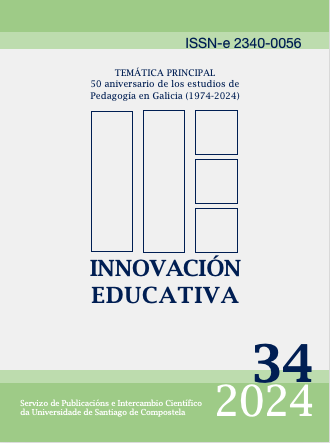Migrant populations: What is the future of their education?
Main Article Content
Abstract
Based on the study of the latest UNESCO Report (2021), Reimagining our futures together. A new social contract for education, in which special attention is paid to minority and migrant populations, the objective of this work is to highlight the deficiencies that currently exist at a social and educational level to provide quality education to this sector of the population, and present guidelines for its improvement in the future. Characteristics of migrant movements and their difficulties in accessing educational services are studied. Conditions for improving their education are analyzed in relation to social reception attitudes, the characteristics of the teaching organization and teacher training A methodology has been used based on the study of specialized bibliography and documents from institutions such as UNESCO, such as the World Education Monitoring Report for 2019 and specifically projected on migrant populations, reference is also made to the Declaration of New York for Refugees and Migrants of 2016, to the Global Compact for Safe, Orderly and Regular Migration promoted by the UN in 2018 and to the Global Compact on Refugees of 2018. This work concludes with the realization of a series of proposals for the qualitative improvement of the education of migrant populations related to their social reception, their integration into the educational system and the improvement in the training and provision of teachers.
Keywords:
Article Details
References
Aventosa, E. (2020). Análisis comparado de la formación de Maestros y maestras en España respecto al desarrollo de las metas de la Agenda 2030. En Díez Gutiérrez E. J. y Rodríguez Fernández, J. R. Educación para el bien común. Hacia una práctica crítica, inclusiva y comprometida socialmente. Octaedro.
Cernadas, F., Lorenzo, M., Santos, M., (2019). Diversidad cultural y escenarios migratorios. Un estudio sobre formación de profesores. Educar, 55/1, 19-37. https://doi.org/10.5565/rev/educar.961
Comisión Europea (2019). Integrating Students from Migrant Backgrounds into Schools in Europe National Policies and Meassures. Luxemburgo Publications Office of the European Union
Delors, J. (1996). La educación encierra un tesoro. Santillana/UNESCO
Etxeberría, F. y Elósegui, K. (2010). Integración del alumnado inmigrante: obstáculos y propuestas. Revista Española de Educación Comparada. 16, 235-263.
Faure, E (1974) Aprender a ser: la educación del futuro. Alianza
González, J. y Rodríguez, R. (2020). Políticas interculturales en las escuelas: significados, disonancias y paradojas. Educación, 387, 67-88.
Ichou, M. (2015). Orige migratoire et inegalités scolaires:étude longitudinale des resultads scolaires des descendants d´inmigrés en France et en Anglaterre. Revue Française de Pedagogie, 191, 29-46. https://doi.org/10.4000/rpf.4742
MECD (2014). PISA 2012. Programa para la evaluación internacional de los alumnos, INEE.
MECD (2016). PISA 2015. Programa para la evaluación internacional de los alumnos. INNE
Moussay, S. y Ria, L. (2014). Nouvelles prescrptions du travail dans les colléges en zone d´education prioritaire:quelles transformations de l´activité enseignante? Revue Fançaise de Pedagogie, oct-diciemb. 2015. https://doi.org/10.4000/rpf.4632
Morin, E. (2000). Los siete saberes necesarios para la educación del futuro. Paidós
OIM (2018). Informe sobre las Migraciones en el Mundo. Ginebra
ONU (2018a). Pacto Mundial sobre Migración Segura, Ordenada y Regular. En https://www.iom.int/global-compact-migration
ONU (2018b). Pacto Mundial sobre Refugiados. En https://news.un.org/es/story/2018/12/1448171
Rosales, C. (2022). El pensamiento sobre la educación a través del tiempo y las culturas. Innovación Educativa, 32. https://doi.org/10.15304/ie.32.8257
Rubia, M. (2020). El proceso de migración en relación con la educación del alumnado inmigrante en España. En Fernández-Hawrylak, M.; Heras, M.; Gómez, J.A. Ampliando horizontes en educación inclusiva. Universidad.
Sleeter, Ch. (2020). Combatir el racismo y el colonialismo por medio de los estudios étnicos. Educar, 387, 15-38. Doi:10.44.38//1988-592X-RE-2020-387-437
UNESCO (2018). Informe de Seguimiento de la Educación en el Mundo. 2017-2018. En www.unesco.org/publishing.www.unesco.org/gemreport
UNESCO (2019) Informe Mundial de Seguimiento de la Educación en el Mundo. ONU.
UNESCO (2021). Reimaginar juntos nuestros futuros. Informe de la Comisión Internacional sobre los futuros de la Educación. UNESCO. https://doi.org/10.22201/iisue.24486167e.2022.177.61072
Vargas, P.; Macía, E.; Aguilera, J.L. (2020). Inclusión del alumnado extranjero en los centros educativos de Madrid. Un estudio de caso de las aulas de enlace. En Díez Gutiérrez E. J. y Rodríguez Fernández, J. R. Educación para el bien común. Hacia una práctica crítica, inclusiva y comprometida socialmente. Octaedro.
Most read articles by the same author(s)
- Carlos Rosales López, Gewerc, A. (2010) (Coord.). El lugar de las TIC en la enseñanza universitaria: estudio de casos en Iberoamérica. Málaga: Aljibe , Innovación educativa: No 21 (2011): Inclusive education
- Carlos Rosales López, Contexts of the educational innovation , Innovación educativa: No 22 (2012)
- Carlos Rosales López, Revista Foro de Educación, ISSN 1698-7799. , Innovación educativa: No 22 (2012)
- Carlos Rosales López, Santos, M. y Lorenzo, M. (Eds.) (2012). Estudios de pedagogía intercultural. Barcelona: Octaedro. ISBN: 978-84-9921-254-8. Nº páginas: 188. , Innovación educativa: No 22 (2012)
- Carlos Rosales López, Pérez Ferra, Miguel (Coord.) (2012). Asesoramiento al Profesorado de Secundaria para Mejorar la Calidad de los Centros. Jaén: Joxman. ISBN: 978-84-15364-11-5. Nº páginas: 201. , Innovación educativa: No 22 (2012)
- Carlos Rosales López, Health and lifestyles of primary schools pupils , Innovación educativa: No 24 (2014): Topics: "School mediation" and "Rural school"
- Carlos Rosales López, Contributions in “Innovación Educativa” (1990-2014, numbers from 0 to 24) to the implementation of the cross cutting issues (living together and health) , Innovación educativa: No 25 (2015): Institutes of Education Sciences. Research, innovation and training from its creation to the present day
- Carlos Rosales López, Reseña del libro: Barba Núñez, M.; Morán de Castro, C.; Cruz López, L. (2017). Animación sociocultural en prisión. Experiencia en el Centro Penitenciario de Monterroso , Innovación educativa: No 27 (2017): Conflict and coexistence in School
- Carlos Rosales López, What are the areas of educational transversality? , Innovación educativa: No 29 (2019): Innovative educational responses to climate change
- Carlos Rosales López, Scenarios and strategies for transversal learning , Innovación educativa: No 30 (2020): Cross-curricular learning







